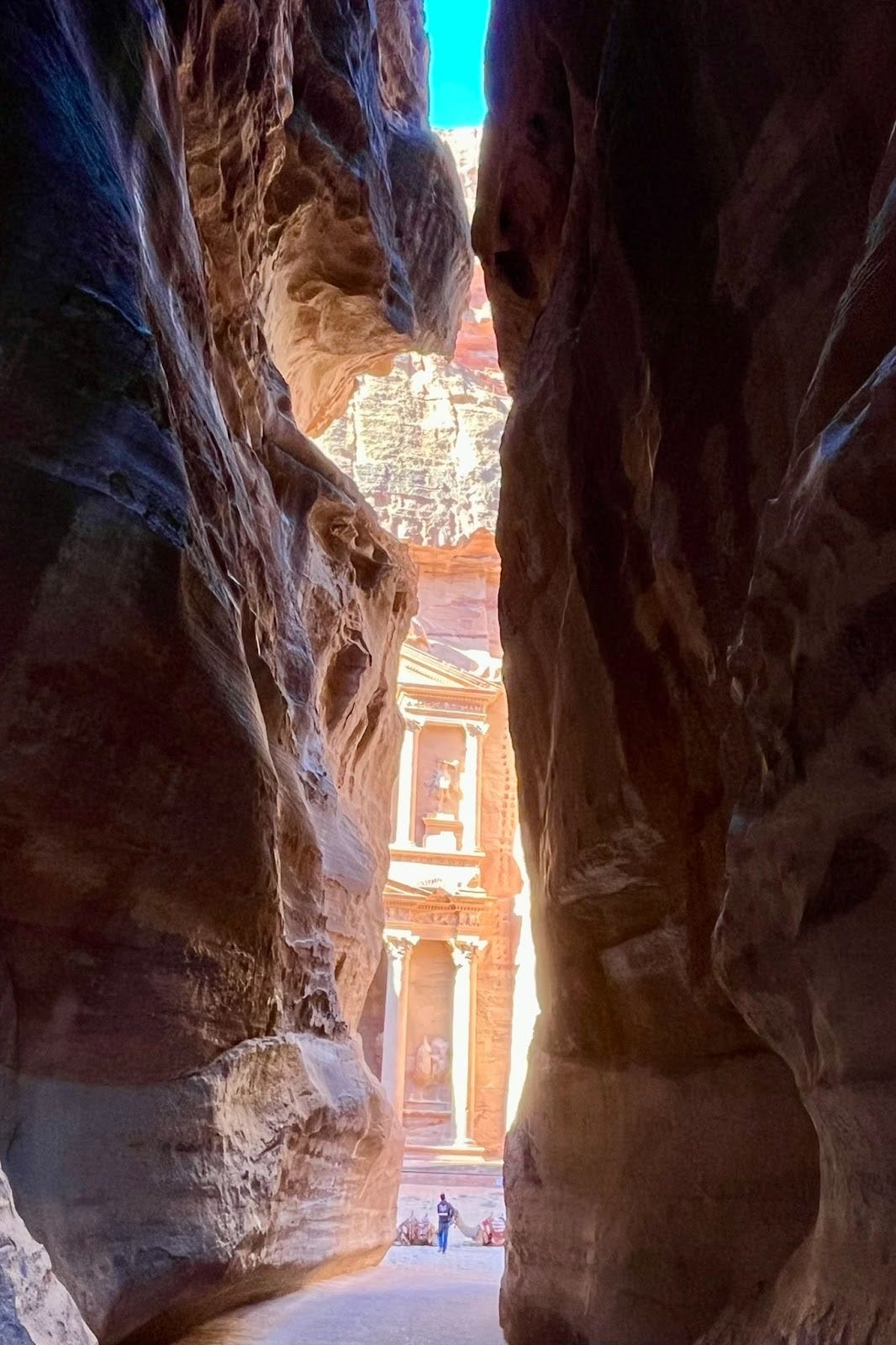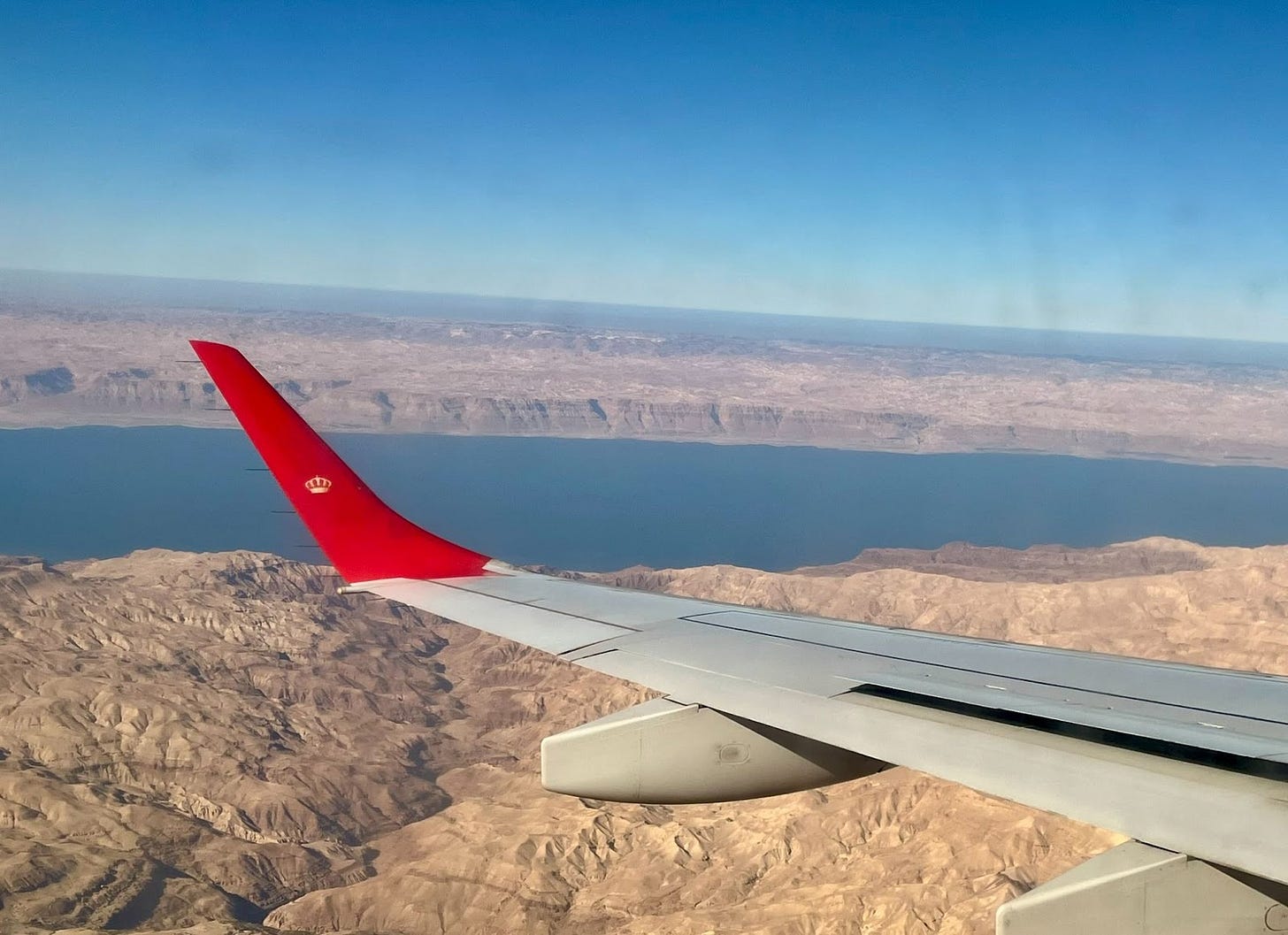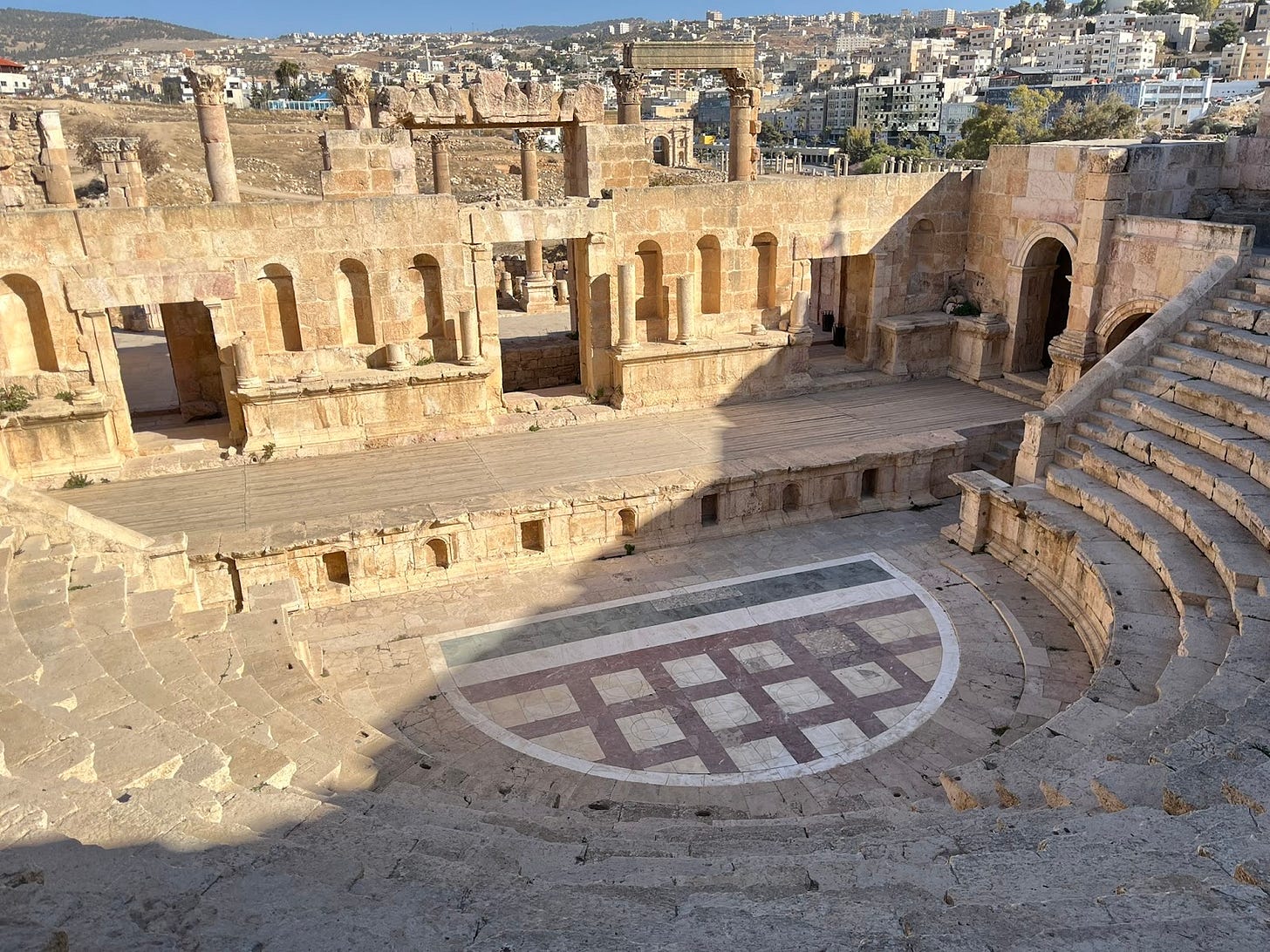I love it when I want to go to a country for one reason, but my takeaway is something else entirely. In Jordan I wanted to see Petra, period. Don’t get me wrong, Petra was amazing. It’s worth going to Jordan just for Petra. It was fun to learn about the Nabateans, whom I’d never heard of but who built Petra beginning in the 3rd century BC. I liked learning about the history of this important trading center, and seeing how huge the city of Petra was, and how much unearthing there is still to be done.

But the thing I was most surprised about in Jordan had nothing to do with Petra, or with other famous sites we saw, including Jerash, the best-preserved Roman city outside of Rome itself. Instead it was the political structure of the country. It was the apparent support—or love?—for the monarch, King Abdullah, and his predecessor King Hussein.
Mark and I went to dinner at a restaurant in Petra and there was a documentary playing on several large screens: “Jordan—The Royal Tour,” featuring King Abdullah touring the country in 2002. It shows him on a motorcycle, in a helicopter, scuba diving, and sand-surfing. This guy is an athlete, pilot and a thrill-seeker. It shows him with his wife Rania and their kids. It shows him in all the famous spots that tourists want to see, including Petra and Wadi Rum. He’s handsome, his wife is beautiful, and so are their kids. It’s all very Camelot.
I wondered whether restaurants are somehow pressured to show this documentary to tourists. But our Jordanian tour guides were equally complementary about the King.
Were they just spouting the official line when they told us how great their monarch has been? They explained how the King appoints a Prime Minister, who does the day-to-day governing; the King only intervenes in important matters of international affairs or important domestic issues. International observers report that, in this constitutional monarchy, elections to the Parliament are generally free and fair.
Abdullah is the longest-serving current leader of any Arab country. Abdullah’s father, King Hussein, ruled for 47 years, so Abdullah, now in his 25th year of power, has big shoes to fill. Their family, the Hashemites, have ruled Jordan since 1921, when the British created Transjordan. The Hashemites are considered by many Sunni Muslims to be direct descendants of the Prophet Muhammad.
Abdullah is credited with improving the status of women in Jordan. For example, he instituted a minimum quota for the number of women in Parliament. Women’s health indicators are good compared to countries with similar income levels. However, the labor force participation rate for women in Jordan remains very low at 14% (Egypt is similar at 16%; in the U.S. it’s 57%).
I observed in Jordan that, unlike in Egypt, many Muslim women don’t cover their heads at all, despite the fact that 97% of the population are Sunni Muslim, and Islam is the official state religion. Our guide explained that the decision to cover is personal for each woman — in his own family, for example, one sister wears the hijab and one doesn’t, and his wife does not.
The King seems to be politically savvy and replaces the government (the Prime Minister) when the people get upset, as when the Arab Spring was disrupting other countries and deposing monarchs, and there were large protests in Jordan. This King survived. Abdullah is also credited with fostering inter-faith dialogue and cooperation among religions within Jordan.
Apparently Jordan tries hard to be “the Switzerland of the Middle East.” It’s a difficult role, because Jordan in a tricky spot geographically as well as politically. Its neighbors are Syria, Iraq, Saudi Arabia, and Israel! The King has played an active role in peace negotiations in the Middle East over the years. He kept Jordan out of many regional conflicts, including wars in Iraq, Syria, Israel, and Lebanon.
Abdullah has navigated Jordan’s role as guardian of the Islamic and Christian holy places in East Jerusalem (including the Al-Aqsa Mosque and the Dome of the Rock). This “Hashemite Custodianship” dates back to 1924. This would not be a fun job, dealing with demands from Israel as well as Palestinian entities, and negotiating compromises involving access to these places.
Extremist Islamists have made assassination attempts against Abdullah, and publicly condemn him as a tool of the West. The Muslim Brotherhood is an active political party in Jordan (unlike in Egypt, where it arose, but is now outlawed and lives underground). Many Jordanians say that the Brotherhood is not extremist or violent like the Egyptian version, but nonetheless, the King has taken political steps to restrict the Brotherhood’s power and access to Parliamentary seats.
Jordan’s economy is doing quite well when compared to Egypt, and the King deserves at least some of the credit for that. Jordan has welcomed large numbers of refugees over the years — there are over a million from Syria alone, and there are many from Palestine, as well as from Iraq, Sudan, Yemen, and Somalia. This has caused economic difficulties for the country, but speaks well to how the government has navigated during these difficult times.
Abdullah made state visits during Trump’s first term and during Biden’s term, and impressed U.S. politicians on both sides of the aisle. Jordan is an important ally due to its strategic location, as evidenced by the large amount of military and other aid that the U.S. gives to Jordan each year. In return, Abdullah provided assistance to the US in the fight against ISIL/ISIS. He has consistently called for a two-state solution to the Israel-Palestine problem. During the recent war in Gaza, Jordan provided significant humanitarian aid to Gazans through air drops.
So it appears that, as Kings go, Abdullah is a pretty benevolent one. But before you start thinking that Abdullah fits Plato’s ideal of a “philosopher-king,” be aware that a bit of online research reveals a more complicated picture. Many Jordanians are unhappy with the huge disparity between the ultra-rich ruling family and the plight of average Jordanians. The King amassed large amounts of private wealth while obtaining foreign aid for his economically-stressed country. There is suppression of the press when it comes to dissent or negative information about the king. He has apparently jailed and tortured a number of political dissidents.
I was surprised by the opinion of a Jordanian man I spoke with. We were discussing the U.S. election result, and he asked why the US didn’t have a nice king like Jordan has. Without a king, he said, there are so many problems, like in Egypt and now Syria. I was stunned. Syria finally got rid of an evil dictator, President Assad. Was this man implying that kings are great and presidents are bad? That makes no sense from a historical perspective. Or perhaps he was suggesting that kings are secure from overthrow compared with presidents? Ha, ask Louis XVI and Marie Antoinette about that guillotine, or Czar Nicholas II and his family about how they fared. Regardless, this Jordanian man genuinely seemed to support the Jordanian monarchy.
I tried to keep an open mind about this unelected ruler of Jordan. Monarchies vary a great deal in how much power the monarch has, from a symbolic role (e.g., in Great Britain) to an autocracy (e.g., in Saudi Arabia). Jordan’s monarchy is in-between. The King is head of the military, head of state, approves laws, and appoints the Prime Minister, among other powers. And of course, he’s there for life.
Sorry, but we got rid of our king long ago. Despite what some may say about the new U.S. President, we’re not going back. I believe in our system of democracy with its elected executive and term limits. I agree with the famous quote (attributed to Churchill but apparently stolen) that democracy is the worst form of government except for all the others. Don’t get me wrong, I’m stressed and anxious about the current threats to our democracy. I’m trying to find ways to get more engaged, perhaps on a local or state level, even if just to feel better doing something rather than nothing. But taking the long view, I think our country will survive this.
Back to the topic! I loved Jordan. The people are welcoming and kind and funny. Many went out of their way to urge us to spread the word that Jordan is a safe place to travel. And indeed there were many obvious safety measures in place, including armed guards and metal detectors at hotel entrances.

Jordan’s economy has suffered since the Israel-Gaza war started and tourism dropped greatly; hotel bookings in Petra, for example, are down 90%. And because many tours to Jordan are combined with Israel, those tours aren’t happening now. Jordanians told us they wish that foreigners would visit Jordan on its own (our trip was an optional add-on to the Egypt trip, and only 8 of our group of 17 opted for Jordan).

We felt lucky to experience the wonderful sites like Petra and Jerash without the normal crowds, but we also felt sorry for the merchants and small businesses that rely on tourism dollars. So I’m going to break my rule about not making travel recommendations on this site, and make a pitch this time:
If you’re going to travel abroad, consider Jordan!
Photos by Jill Martin except where otherwise indicated.
Previous Posts on Egypt:
Mut, Moses, Mary, and Muhammad
Sources, or for further reading:
https://www.britannica.com/biography/Abdullah-II https://mena.fes.de/blog/e/political-reform-in-jordan-whats-in-for-women.html https://data.worldbank.org/indicator/SL.TLF.CACT.FE.ZS?locations=JO https://www.state.gov/reports/2022-country-reports-on-human-rights-practices/jordan/






Fascinating! Thank you for this insightful look at Jordan!
Beautifully written as always. Unfortunately, we have cancelled several trips to Jordan due to problems in Israel. Great suggestion to add it to Egypt, which is high on our list. Keep travelling and writing, I love the stories and the tips!!